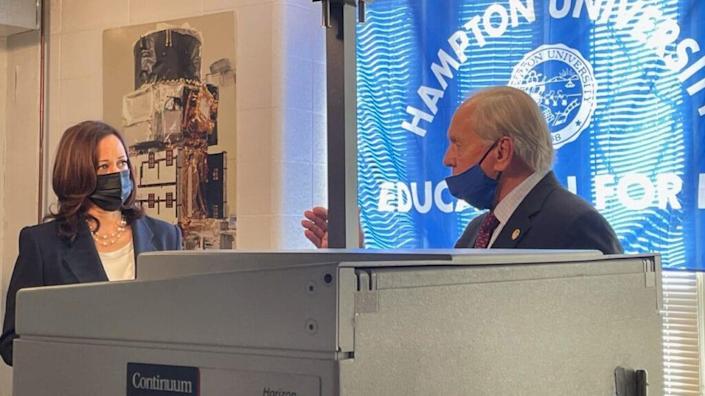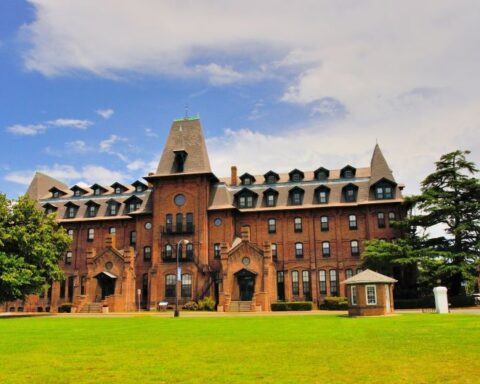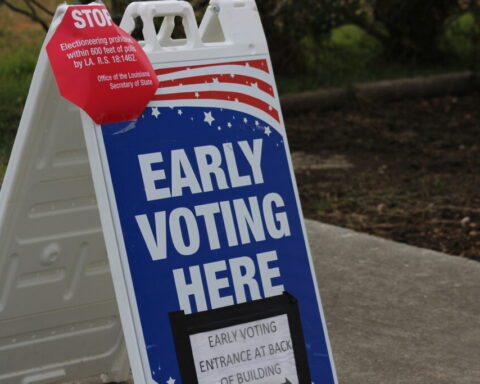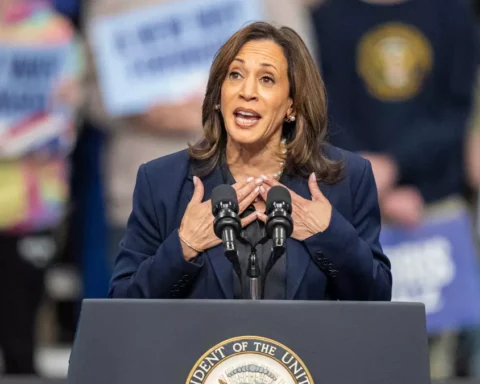By Jessica Floyd,
“If we are to invest in the strength of our nation we must invest in our HBCUs,” said Vice President Harris on Friday at the Home by the Sea campus.
“HBCUs are not only competing but they’re leading,” Vice President Kamala Harris said during a visit to Hampton University on Friday.
A majority of the vice president’s trip to Hampton focused on the intersection of Science, Technology, Engineering and Mathematics educations and Historically Black Colleges and Universities (HBCUs). The White House, which is in the midst of its 2021 National HBCU Week, has been heavily driving initiatives to create more opportunities for HBCU students who are seeking entry into STEM industries.
While Harris is an alumna of another HBCU, Howard University, she praised students of the Home by the Sea who are participating in partnerships with federal agencies.
Vice President Harris contends that “historically, presently and in the future” the partnership of Black students and agencies like NASA, NOAA and other STEM related organizations is vital.
In addition to its strengthening of STEM partnerships for HBCUs, the Oval Office has announced its intent to name Tony Allen as chair of the President’s Board of Advisors on HBCUs. This board will advance the goal of the White House Initiative on HBCUs, established by the Carter Administration, to increase the capacity of HBCUs to provide the highest-quality education to its students.
Earlier this week, the importance of STEM opportunities and HBCUs hit close to home for the Vice President Harris’s alma mater, Howard. The Hilltop’s first week of classes came to a screeching halt after a cyber attack took hold of its digital infrastructure.
This is not the first time an HBCU has been the target of a cyberattack, however, it presents an opportunity for Howard University, and other HBCUs that could also suffer the same kind of attack, to use the moment as a chance to bolster its STEM program and its student body to become leaders of the field.
In an interview with theGrio, Tougaloo College President Carmen Waltersrecalled the time when her institution battled hackers.
“We have experienced this and we can help other HBCUs understand why it is important that they have the right people on their campuses, on our campuses to handle our technology and to make sure that we are ahead of the curve,” Walters explained.
She said it prompted the college to invest more in its students’ knowledge base on cybersecurity.
A major huddle Black students have to jump over to enter the industry is a lack of representation, according to Congresswoman Yvette Clarke of New York, , who is the chair of the House subcommittee on cybersecurity. But experiencing the challenges of a hack allowed for students to recognize an industry that needs more specialists — and experts who look like them.
“If young people of color do not know people who work in cybersecurity or see examples of people who look like them working in these jobs, they may not be able to envision themselves working in cybersecurity,” said Congresswoman Clarke, who highlighted the significance of the Biden-Harris Administration’s initiatives. “They may not know about the opportunities.”
Congresswoman Clarke tells theGrio HBCUs are the future of the industry despite currently only representing 9% of the sector.
A Scholarship for Service program operated by the Department of Homeland Security and the National Science Foundation (NFS) provides scholarships and stipends to students pursuing cybersecurity-related degrees in exchange for two years of federal service. Hampton University, Morgan State College, Norfolk State University, North Carolina Agriculture and Technical State University, Tuskegee University are among the HBCUs that participate in the program as part of an effort to shore up the nation’s cyber workforce.
During Friday’s visit to Hampton University, Vice President Harris emphasized the need to support HBCUs in this effort. “If we are to invest in the strength of our nation we must invest in our HBCUs,” she said.







